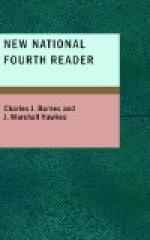“It was now curious to look around and see the gauchos trying to bring their horses back to the corral, which is the most difficult part of their work, for the poor creatures had been so scared there that they were unwilling to return to the place.
“At last they brought the horses back, apparently subdued and broken in. The saddles and bridles were taken off, and the young horses trotted off towards the corral, neighing to one another.
“When a gaucho wishes to take a wild horse, he mounts a horse that has been used to the sport, and gallops over the plain.
“As soon as he comes near his victim, the lasso is thrown round the two hind-legs, and as the gaucho rides a little on one side, the jerk throws the wild horse without doing injury to his knees or his face.
[Illustration]
“Before the horse can recover from the shock, the rider dismounts, and snatching his cloak from his shoulders, wraps it round the fallen animal’s head.
“He then forces into his mouth one of the powerful bridles of the country, fastens a saddle on his back, and, mounting him, removes the cloak.
“Upon this the astonished horse springs to his feet, and attempts to throw off his new master, who sits calmly on his back.
“By a treatment which never fails, the gaucho brings the horse to such complete obedience that he is soon trained to give his whole speed and strength to the capture of his companions.”
* * * * *
Directions for Reading.—Let pupils pronounce in concert, and singly, the following words: I, hide, side, rides, flight, wild, finds, retire, describe.
Mark the inflection of the last six lines of poetry on page 256.[15]
What inflection is used (1) to keep up the interest?—(2) to show hesitation?—(3) to express a decided opinion?—(4) to give the conclusion of a story?—(5) to ask a question that may be answered by yes or no?—(6) to ask a question that can not be answered by yes or no?
Let pupils state the special uses of inflection shown in the following examples.
I, I think perhaps you may go.
I know that you may go.
They silently went away.
Yesterday, about three o’clock, just as we were preparing to go home, suddenly we heard a band of music.
[15] This lesson.
* * * * *
LESSON LV.
career’, course of life.
gen’erous, free in giving aid to others.
char’ity, goodwill; desire to aid others.
in her’ited, came into possession of.
in jus’tice, wrong-doing.
ac cused’, charged with a fault.
hes i ta’tion, delay.
pre scrip’tion, an order for medicine.




